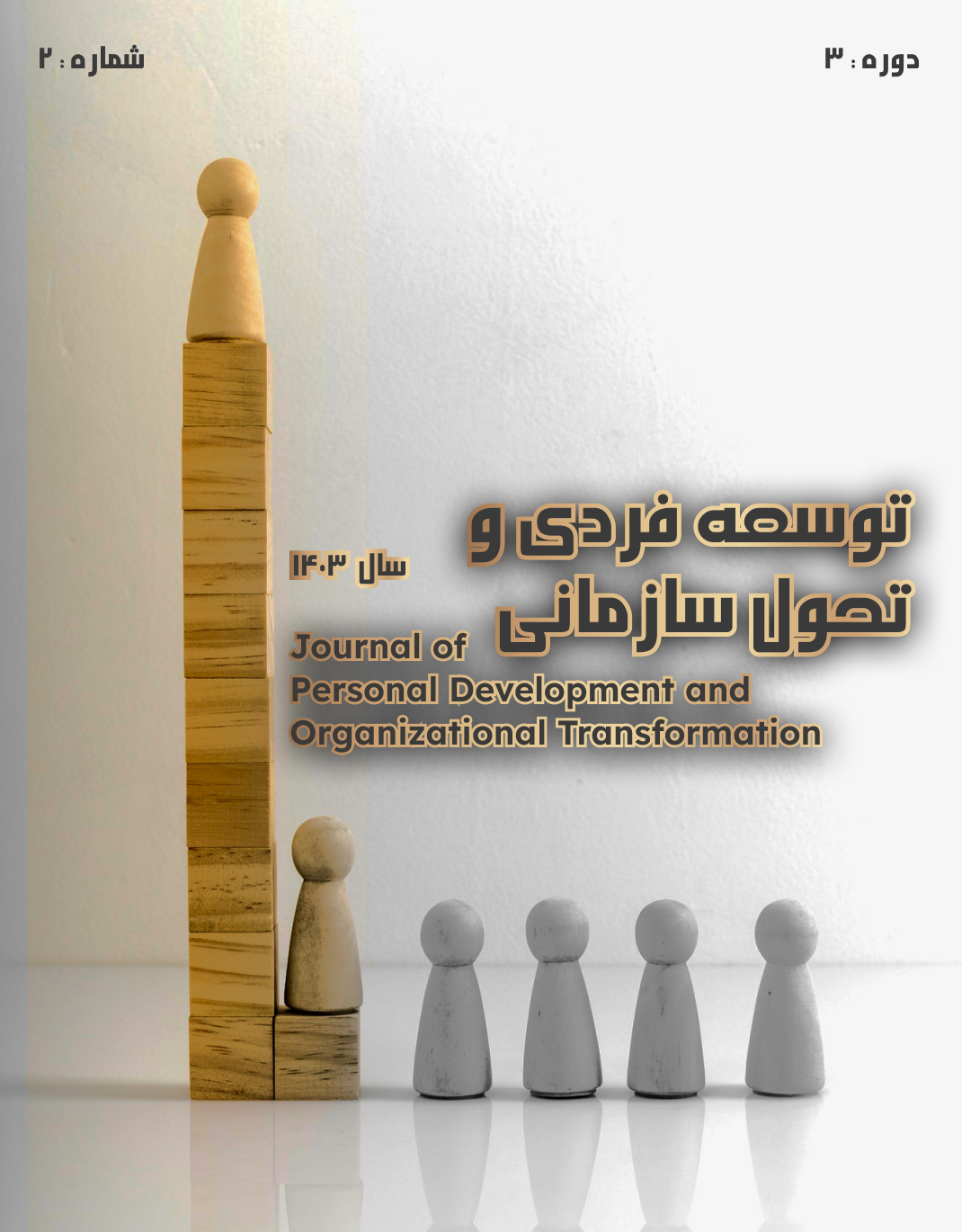Identifying the Factors Influencing Professional Identity through the Hidden Curriculum Approach in University Students
Keywords:
Professional identity, hidden curriculum, educational experiencesAbstract
The aim of this study was to investigate the factors influencing professional identity through the hidden curriculum approach among university students in Mazandaran Province. This study is applied in terms of its purpose and employs a mixed-methods approach (qualitative and quantitative). The statistical population in the qualitative section included 20 experts and faculty members in the field of educational sciences, and in the quantitative section included 47,507 university students from Mazandaran Province. The sample size in the qualitative phase was 12 participants, and in the quantitative phase, 380 students were selected using Cochran’s formula and stratified random sampling based on academic fields. In the qualitative section, semi-structured interviews were used, and in the quantitative section, a researcher-made questionnaire on professional identity based on the hidden curriculum was employed. This questionnaire included 17 items and 1 dimension labeled “causal conditions,” with one component titled “educational experiences.” For qualitative data analysis, the study followed the three stages of open coding, axial coding, and selective coding. For quantitative data analysis, exploratory factor analysis, confirmatory factor analysis, and structural equation modeling were used. The results indicated that educational experiences, as a key variable within the hidden curriculum, have a significant impact on the formation of students’ professional identity, with a coefficient of 0.752. This value indicates a moderate to strong effect of causal conditions on the formation of professional identity. Overall, it can be concluded that educational experiences play an indispensable role in the formation, enhancement, and direction of students’ professional identity. Therefore, universities and educational institutions must consistently and comprehensively evaluate the quality of these experiences and create appropriate conditions for their enhancement.
Downloads
References
Anegas, D. L., Pinner, R. S., Larrondo, I. D., & Branson, D. C. (2021). Funds of Professional Identity in Language Teacher Education: A Longitudinal S tudy on S tudent-Teachers Student trauma, the hidden curriculum, and cultural humility: This trio needs a team approach. Tesol Quarterly, 56(2), 445-473. https://doi.org/10.1002/tesq.3060 10.4018/978-1-7998-0319-5.ch005
Brouwer, J. (2021). What makes a nurse today? A debate on the nursing professional identity and its need for change. Nursing Philosophy, 22(2), e12343. https://doi.org/10.1111/nup.12343
Cruess, S. R., Cruess, R. L., & Steinert, Y. (2019). Supporting the development of a professional identity: general principles. Medical Teacher, 41(6), 641-649. https://doi.org/10.1080/0142159X.2018.1536260
Czerniawski, G. (2023). Professional development or professional learning: developing teacher educators' professional expertize. In R. J. Tierney, F. Rizvi, & K. Ercikan (Eds.), International Encyclopedia of Education (Fourth Edition) (pp. 469-474). Elsevier. https://doi.org/10.1016/B978-0-12-818630-5.04050-1
Dickinson, J., Fowler, A., & Griffiths, T. L. (2022). Pracademics? Exploring transitions and professional identities in higher educationJO - Studies in Higher Education. 47(2), 290-304. https://doi.org/10.1080/03075079.2020.1744123
Dur, Ş., Göl, İ., Erkin, Ö., & Yildiz, N. U. (2022). The effect of moral intelligence on cultural sensitivity in nurses. Perspectives in psychiatric care, 58(4), 2423-2432. https://doi.org/10.1111/ppc.13077
Gholampour, M., & Ayati, M. (2020). Factors affecting the development of a teacher's professional identity: A narrative-research of a teacher's life events. Journal of Educational Sciences, 27(2), 1-22. https://education.scu.ac.ir/article_16594.html
Jackson, D. (2017). Developing pre-professional identity in undergraduates through work-integrated learning. Higher Education, 74(5), 833-853. https://doi.org/10.1007/s10734-016-0080-2
Lee, M. Y., & Kutty, F. M. (2023). Emotional Intelligence and Professional Identity of Student Teachers During Practicum. International Journal of Academic Research in Business and Social Sciences, 13(4). https://doi.org/10.6007/ijarbss/v13-i4/16736
Li, X., Xiao, W., Sun, C., Li, W., & Sun, B. (2022). Does Burnout Decrease With Teacher Professional Identity Among Teachers in China? Journal of Career Development, 50(5), 983-996. https://doi.org/10.1177/08948453221138937
Mount, G. R., Kahlke, R., Melton, J., & Varpio, L. (2022). A critical review of professional identity formation interventions in medical education. Academic Medicine, 97(11S), S96-S106. https://doi.org/10.1097/ACM.0000000000004904
Sarraf-Yazdi, S., Teo, Y. N., How, A. E. H., Teo, Y. H., Goh, S., Kow, C. S., & Krishna, L. K. R. (2021). A scoping review of professional identity formation in undergraduate medical education. Journal of General Internal Medicine, 36(11), 3511-3521. https://doi.org/10.1007/s11606-021-07024-9
Toh, R. Q. E., Koh, K. K., Lua, J. K., Wong, R. S. M., Quah, E. L. Y., Panda, A., & Krishna, L. K. R. (2022). The role of mentoring, supervision, coaching, teaching and instruction on professional identity formation: a systematic scoping review. BMC Medical Education, 22(1), 531. https://doi.org/10.1186/s12909-022-03589-z
Tomlinson, M., & Jackson, D. (2021). Professional identity formation in contemporary higher education students. Studies in Higher Education, 46(4), 885-900. https://doi.org/10.1080/03075079.2019.1659763
Wang, Y., Xia, Q., Yue, H., & Teng, W. (2024). Chinese Rural Kindergarten Teachers’ Work–Family Conflict and Their Turnover Intention: The Role of Emotional Exhaustion and Professional Identity. Behavioral Sciences, 14(7), 597. https://doi.org/10.3390/bs14070597
Wu, J., Ghayas, S., Aziz, A., Adil, A., & Niazi, S. (2024). Relationship Between Teachers’ Professional Identity and Career Satisfaction Among College Teachers: Role of Career Calling. Frontiers in psychology, 15. https://doi.org/10.3389/fpsyg.2024.1348217
Yakov, G., Riskin, A., & Flugelman, A. A. (2021). Mechanisms involved in the formation of professional identity by medical students. Medical Teacher, 43(4), 428-438. https://doi.org/10.1080/0142159X.2020.1854706
Yao, X., Yu, L. A. U. S. Y., Kang, Z., & Wang, X. (2021). The role of self-efficacy in mediating between professional identity and self-reported competence among nursing students in the internship period: a quantitative studyJO - Nurse education in practice. 57, 103252. https://doi.org/10.1016/j.nepr.2021.103252
Zeng, L., Chen, Q., Fan, S., Yi, Q., An, W., Liu, H., & Huang, H. (2022). Factors influencing the professional identity of nursing interns: a cross-sectional study. BMC Nursing, 21(1), 200. https://doi.org/10.1186/s12912-022-00983-2
Zhao, Q. (2022). On the role of teachers' professional identity and well-being in their professional development. Frontiers in psychology, 13, 913708. https://doi.org/https://doi.org/10.3389/fpsyg.2022.913708
Downloads
Published
Submitted
Revised
Accepted
Issue
Section
License
Copyright (c) 2025 زهرا کریم النفس , بابک حسین زاده, سیده زهرا حسینی درونکلائی (نویسنده)

This work is licensed under a Creative Commons Attribution-NonCommercial 4.0 International License.







